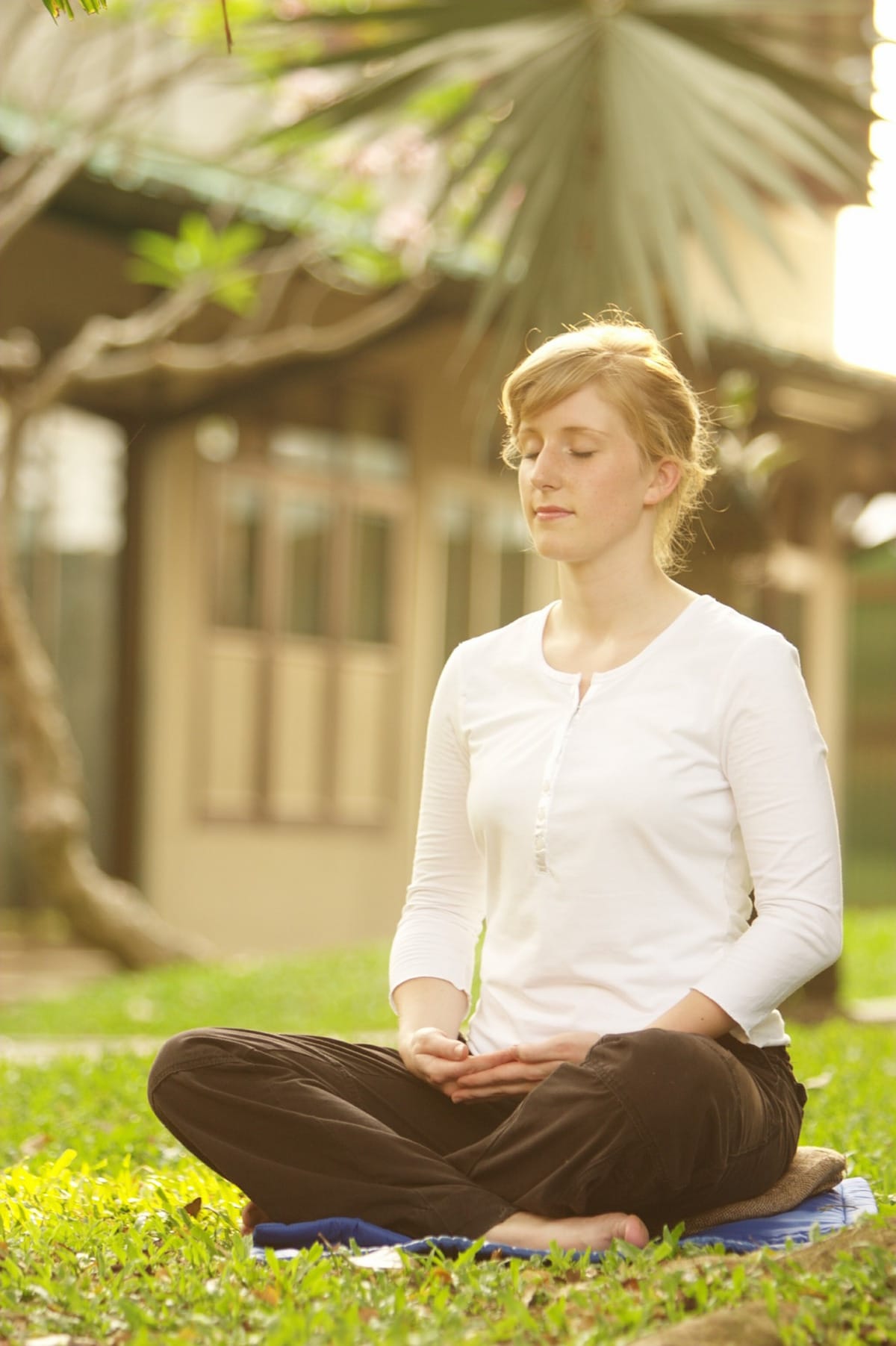There’s a lot of misunderstanding about meditation. In fact, says Karen Maezen Miller, that’s pretty much all that meditation is — the process of seeing how very much you’ve misunderstood about it and everything else.
We might be drawn to meditation because we want more out of life and ourselves. We might want to be more centered, for example. More peaceful. More focused. More balanced. More patient. More mellow. More wise. More like my ex-boyfriend who liked to meditate.
These may be all the reasons we are drawn to meditation, but they are not the reasons we meditate. We meditate because there is a six-foot flame dancing on top of our heads. It has made us mighty uncomfortable for quite some time up there. We try to pretend otherwise, but have you noticed? We have a fire on our heads! It keeps crossing the containment lines! The temperature shoots up and we prance about, panicked, frantic, holding our breath lest we stoke the inferno, but it rages anyway. About the time our eyebrows singe, we might heed the call of rescue.
That’s how bad it has to get. If meditation is one of an array of self-improvement options you are considering, you probably won’t do it. By all means, try the ninety-minute massage first! Get the new wardrobe and the hair tint! Meditation is the option of having no other option, no higher goal, and no more righteous intention than saving your sorry ass from a living hell.
Everything happens when you meditate. Whole worlds are dismantled, innumerable scores are settled, grievous deeds are undone, and the entire universe settles at rest.
This is why I was so fortunate to have smacked headfirst into Zen meditation. Because in Zen, you see, we don’t meditate on anything. We don’t meditate on world peace, for instance, or loving-kindness, or forgiveness, or to acquire any of the lofty virtues that we or our dastardly neighbors so glaringly lack. Meditating on something else would just fuel the conflagration up top. We might be reminded — as if we needed reminding — of what we don’t have, how we don’t act, what we don’t like, who said what to whom and how lousy we feel because of it. We meditate instead to quench the flame on our heads, to quiet the torment and silence the roar. That alone brings salvation, peace, love, and forgiveness. How? By itself. We have a wellspring of all that within us, a deep and eternal aquifer of fire retardant, when we give ourselves the breathing room to find it.
That’s what we do in Zen meditation, or zazen. Breathe. Simply breathe, attending to our own breath as it rises and falls, fills and empties, counting it from one to ten and all over again just to give our brilliant brains something to do. We do this with our eyes open, looking at a wall or the floor in front of us. It’s easy to think we don’t know how to do it, and easy to think we’re not doing it right, but this is the way to see that thoughts like that are just — oh yeah, look at that — thoughts, and we start counting again.
“Imagine that your nose is two inches beneath your navel,” I read in one set of instructions. That may not be an appealing picture in your mind, so don’t picture it in your mind. Don’t picture it, and you’ll immediately learn something amazing about yourself. Just by hearing the words, you automatically release the cinch in your belly, and your breath instantly deepens and slows down. For all the wayward searching for truth and authenticity in our lives, breathing is the most original, authentic, and autonomous thing we do. You know how to breathe, and only you can do it.
In Zen, you see, we don’t meditate on anything. We don’t meditate on world peace, for instance, or loving-kindness, or forgiveness, or to acquire any of the lofty virtues that we or our dastardly neighbors so glaringly lack.
“I feel dignified,” I wrote after my first solo attempt at sitting still. For the first time in what seemed like forever, I felt a breeze waft over my head. The breeze was my own breath. The breath was my own life. The dignity was my birthright.
Meditation is misunderstood because it doesn’t look like anything happens in those torturous few minutes of motionlessness. But everything happens when you meditate. Whole worlds are dismantled, innumerable scores are settled, grievous deeds are undone, and the entire universe settles at rest.
Most of us say about ourselves: “I have a hard time letting go.” Exhalation is the most complete expression of letting go, and we do it without thinking thirty thousand times a day. You know how to let go, and only you can do it.
Meditation is misunderstood as something you envision in your head, when in fact it is something to be seen with your own eyes. What you begin to see is that the place where you thought your life occurred — the cave of rumination and memory, the cauldron of anxiety and fear — isn’t where your life takes place at all. Those mental recesses are where pain occurs, but life occurs elsewhere, in a place we are usually too preoccupied to notice, too distracted to see: right in front of our eyes. The point of meditation is to stop making things up and see things as they are.
When I give meditation instruction these days, I ask students to lift their arms up to eye level, wiggle their fingers, and see for themselves. That’s where your life is, that’s where your life has always been, in front of you, and now you know how I got mine back.
From Hand Wash Cold: Care Instructions for an Ordinary Life, ©2010 by Karen Maezen Miller. Reproduced with permission of New World Library.
